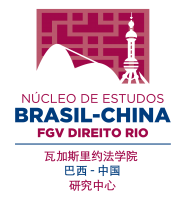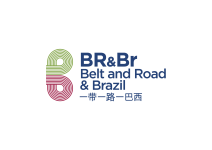About the Belt and Road & Brazil (BR&Br)
The Belt and Road & Brazil (BR&Br) is a project launched by the Center for Brazil-China Studies of the School of Law of the Getulio Vargas Foundation in Rio de Janeiro (FGV Direito Rio) in 2019. The expression Belt and Road is an abbreviated way to refer to the Silk Road Economic Belt and the 21st Century Maritime Silk Road, initiatives proposed by Chinese President Xi Jinping during his visit to Central Asia and Southeast Asia in late 2013. The expansion of China's business and its foreign policy must be in line with the initiative, which is why understanding BRI and the challenges it brings to Brazil is key, given the relevance of the bilateral trade partnership and the importance of Chinese investments to Brazil.
The objectives of BR&Br are:
1) Producing and disseminating publications, such as articles, opinions and interviews, news, events, videos and legal and diplomatic documents on the Belt and Road Initiative (BRI) and on Sino-Brazilian relations;
2) Developing research and studies on ways to connect the Belt and Road with Brazil and Latin America, mainly in the fields of infrastructure, trade relations, financial integration and people-to-people exchange, taking into account (i) the Chinese government's initiatives to promote the Belt and Road; (ii) the legal and economic arrangements in terms of bilateral relations between Brazil and China in the context of Belt and Road; and (iii) arrangements at the multilateral level, in particular, in the BRICS platform, the China-CELAC Forum, the New Development Bank (NDB) and the Asian Infrastructure Investment Bank (AIIB); and
3) Understanding the legal issues and those related to conflict resolution in the context of bilateral business, which is, from the Chinese perspective, developed in the context of the Belt and Road.
About the Center for Brazil-China Studies
The Center for Brazil-China Studies of FGV Direito Rio was created in October 2017 to develop research and studies on Sino-Brazilian relations, contributing to the development of bilateral relations, especially in the academic and legal spheres. FGV Direito Rio was the first School of Law to have a center dedicated to comparative studies focusing on legal issues that affect the development of the relationship between Brazil and China.
The Center for Brazil-China Studies is linked to the Center for Research in Law and Economics (CPDE) of FGV Direito Rio and emerged in a context of China's rise as the second largest economy in the world and as the largest trading partner of Brazil and South America. This landscape resulted in developments in the legal-diplomatic relationship between the countries involved and posed the challenge of producing sophisticated knowledge about Chinese legal culture, and such knowledge emerges as fundamental given the new economic status of the Asian giant and its governance model, both within the scope of the government and business structures.
About FGV Direito Rio
The School of Law of the Getulio Vargas Foundation in Rio de Janeiro (FGV Direito Rio) was created in 2002, aiming to offer the country a new model of legal education, capable of producing leaders to think about Brazil in the long term. Its mission is to build a Law School to be a reference in Brazil in public legal careers and in business law, forming leaders to think about Brazil in the long term and become a reference in legal education and research to assist in the country's development and advancement.
FGV Direito Rio innovates by choosing a fully participative methodology, in which the student is not a mere spectator, but an active subject of the class. This means a dynamic teaching methodology, which privileges debate, instead of purely expository classes. This occurs in the so-called Socratic method, the didactic basis of classes at the School and which allows, in an objective way, the student to be given a grade for his or her participation. Several participation techniques are used, such as the case study method, group dynamics and other legal contexts, all in an environment of interactivity between student and teacher in classes with a limited number of students.
About FGV
The Getulio Vargas Foundation was founded on December 20th, 1944, with the mission of stimulating national socioeconomic development. Its initial objective was to prepare qualified personnel for the country's public and private administration. At that time, Brazil was already beginning to lay the foundations for the growth that would be confirmed in the following decades. Anticipating the arrival of new times, FGV decided to expand its focus of action and, from a restricted field of administration, it ventured into the broader field of social and economic sciences. The institution went beyond the frontiers of teaching and advanced into the areas of research and information, until it became synonymous with high quality and excellence center.
A leader in the creation and improvement of ideas that contribute to national development, FGV fosters and encourages academic research, which has resulted in relevant production, recognized both nationally and internationally. Themes cover macro and microeconomics, finance, law, health, social security, poverty and unemployment, pollution and sustainable development. Research programs in history, social sciences, education, justice, citizenship and politics are also maintained. The Foundation also carries out commissioned work for the public sector, the private initiative and international organizations such as the World Bank. In addition, by means of the Brazilian Institute of Economics (IBRE), it generates and disseminates, as public goods, indicators and reports that contribute to the guidance of the Brazilian economy.
Global Go To Think Tanks Rankings
For the 11th consecutive year, the Fundação Getulio Vargas has been among the best think tanks in the world. This is what the 2020 Global Go To Think Tank Index Report, released by the University of Pennsylvania, points out. In this edition, FGV was ranked 3rd, standing among the three best think tanks in the world, besides being considered the best think tank in Latin America for the 11th consecutive year. The institution also became hors concours in another category, having been voted the best-run think tank in the world for the fourth year in a row. In several other categories, the institution occupies prominent positions, appearing in the top 10.
The University of Pennsylvania ranking has been prepared since 2006 by the Think Tanks and Civil Societies Program and considers approximately 11,000 think tanks worldwide. The full material is available on the Global Go To Think Tank Index website.


